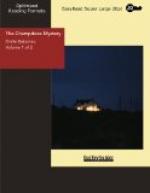Andre fidgeted uneasily in his chair beneath the spell of those magnetic glasses, which seemed to draw the truth from him.
“I cannot tell you, sir,” faltered he at last, “for the secret is not mine to divulge.”
“You will not trust me? Well, then, I must speak. Remember, all that I have told you was the account of what I knew positively; but, in addition to this, I have drawn my own inferences. You are watching De Croisenois because he is going to marry a wealthy heiress.”
Andre blushed crimson.
“We assume, therefore, that you wish to prevent this marriage; and why, pray? I have heard that Mademoiselle de Mussidan was formerly engaged to M. de Breulh-Faverlay. How comes it that the Count and Countess de Mussidan prefer a ruined spendthrift to a wealthy and strictly honorable man? It is for you to answer this question. It is perfectly plain to me that they hand over their daughter to De Croisenois under pressure of some kind, and that means that a terrible secret exists with which Croisenois threatens them.”
“Your deduction is wrong, sir,” exclaimed Andre eagerly, “and you are quite wrong.”
“Very good,” was the calm reply. “Your emphatic denial shows that I am in the right. I want no further proofs. M. de Mussidan paid you a visit yesterday, and one of my agents reported that his face was much happier on leaving you than when he was on his way to your house. I therefore infer that you promised to release him from Croisenois’ persecutions, and in return he promised you his daughter’s hand in marriage. This, of course, explains your present disguise, and now tell me again that I am wrong, if you dare.”
Andre would not lie, and therefore kept silence.
“And now,” continued the gentleman, “how about the secret? Did not the Count tell it you? I do not know it; and yet I think that if I were to search for it, I could find it. I can call to my mind certain crimes which three generations of detective have striven to find out. Did you ever hear that De Croisenois had an elder brother named George, who disappeared in a most wonderful manner? What became of him? This very George, twenty-three years back, was a friend of Madame de Mussidan’s. Might not his disappearance have something to do with this marriage?”
“Are you the fiend himself?” cried the young man.
“I am M. Lecoq.”
Andre started back in absolute dread at the name of this celebrated detective.
“M. Lecoq!” repeated he.
The vanity of the great detective was much flattered when he saw the impression that his name had produced.
“And now, my dear M. Andre,” said he blandly, “now that you know who I am, may I not hope that you will be more communicative?”
M. de Mussidan had not told his secret to the young artist, but he had said enough for him to feel that the detective was correct in his inference.




